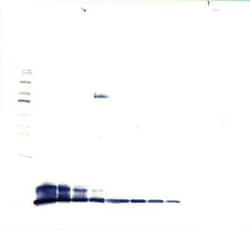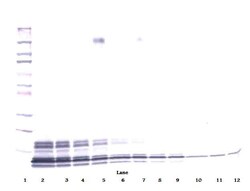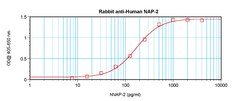Learn More
Invitrogen™ PPBP Polyclonal Antibody, PeproTech®, Invitrogen™
Rabbit Polyclonal Antibody
Supplier: Invitrogen™ 500P03100UG

Description
AA Sequence of recombinant protein: AELRCMCIKT TSGIHPKNIQ SLEVIGKGTH CNQVEVIATL KDGRKICLDP DAPRIKKIVQ KKLAGDESAD. Preparation: Produced from sera of rabbits immunized with highly pure Recombinant Human NAP-2 (CXCL7). Anti-Human NAP-2 (CXCL7)-specific antibody was purified by affinity chromatography employing an immobilized Human NAP-2 matrix. Sandwich ELISA: To detect Human NAP-2 (CXCL7) by sandwich ELISA (using 100 μL/well) a concentration of 0.5-2.0 μg/mL of this antibody is required. This antigen affinity purified antibody, in conjunction with PeproTech Biotinylated Anti-Human NAP-2 (CXCL7) (500-P03BT) as a detection antibody, allows the detection of at least 2000- 4000 pg/mL of Recombinant Human NAP-2 (CXCL7). Western Blot: To detect Human NAP-2 (CXCL7) by Western Blot analysis this antibody can be used at a concentration of 0.1-0.2 μg/mL. When used in conjunction with compatible secondary reagents the detection limit for Recombinant Human NAP-2 (CXCL7) is 1.5-3.0 ng/lane, under either reducing or non-reducing conditions.
Members of the a-chemokine subfamily of inducible, secreted, pro-inflammatory cytokines contain a similar motif, in which the first two cysteine residues are separated by a single residue (Cys-X-Cys), and are also chemotactic for neutrophils. The platelet basic protein (PBP), a member of the a-chemokine family, resides in the a-granules of platelets and is released upon their activation. Proteolytic cleavage of the amino terminus of PBP leads to the generation of several peptides, which include mature PBP, connective tissue-activating peptide III (CTAP III, also designated low affinity platelet factor IV (LA-PF4)), b-thromboglobulin (b-TG), and neutrophil-activating peptide 2 (NAP-2). PBP and its N-truncated derivatives mediate inflammation and wound healing. Specifically, NAP-2 activates chemotaxis and degranulation in neutrophils during inflammation. The gene encoding human PBP maps to chromosome 4q12-q13.
Specifications
| PPBP | |
| Polyclonal | |
| Unconjugated | |
| PPBP | |
| 2400003M24Rik; AI854500; Beta-TG; Beta-thromboglobulin; b-TG1; chemokine (C-X-C motif) ligand 7; connective tissue-activating peptide III; Connective tissue-activating peptide III(1-81); CTAP3; CTAPIII; CTAP-III; CTAP-III(1-81); CXC chemokine ligand 7; C-X-C motif chemokine 7; CXCL7; LA-PF4; LDGF; Leukocyte-derived growth factor; low-affinity platelet factor IV; Macrophage-derived growth factor; MDGF; NAP-2; NAP-2(1-63); NAP-2(1-66); NAP-2(73); NAP-2(74); NAP-2-L1; neutrophil activating peptide-2; neutrophil-activating peptide 2; Neutrophil-activating peptide 2(1-63); Neutrophil-activating peptide 2(1-66); Neutrophil-activating peptide 2(73); Neutrophil-activating peptide 2(74); neutrophil-activating peptide-2; PBP; Platelet basic protein; PPBP; pro-platelet basic protein; pro-platelet basic protein (chemokine (C-X-C motif) ligand 7); SCYB7; small inducible cytokine B7; small inducible cytokine subfamily B, member 7; small-inducible cytokine B7; TC1; TC-1; TC2; TC-2; TGB; TGB1; THBGB; THBGB1; thrombocidin 1; thrombocidin 2; thromboglobulin, beta-1 | |
| Rabbit | |
| Antigen Affinity Chromatography | |
| RUO | |
| 5473 | |
| -20°C | |
| Lyophilized |
| ELISA, Western Blot | |
| 0.1-1.0 mg/mL | |
| PBS with no preservative | |
| P02775 | |
| PPBP | |
| E.coli-derived Recombinant Human NAP-2 (CXCL7). | |
| 100 μg | |
| Primary | |
| Human | |
| Antibody |
The Fisher Scientific Encompass Program offers items which are not part of our distribution portfolio. These products typically do not have pictures or detailed descriptions. However, we are committed to improving your shopping experience. Please use the form below to provide feedback related to the content on this product.


